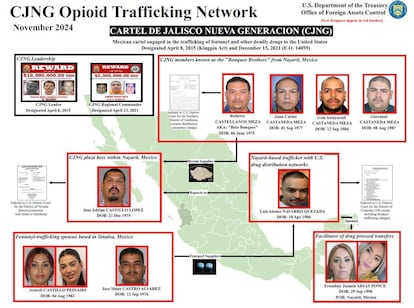US targets financial structure of Mexican cartel CJNG and includes nine partners on the Treasury’s ‘black list’
The Bonques Brothers, key operators of the cartel in the state of Nayarit, will lose access to bank accounts in the international financial system. The move is part of Washington’s fight against fentanyl trafficking from Mexico

The United States has delivered a new blow to the financial structure of the Mexican criminal organization Jalisco New Generation Cartel (CJNG). The Treasury Department announced on Tuesday that it was including nine members of the Bonques Brothers, key allies of CJNG in the Mexican state of Nayarit, on the so-called “black list” of the Office of Foreign Assets Control (OFAC). As a result of these measures, which are part of Washington’s offensive to stop fentanyl trafficking from Mexico, the designees’ banking assets have been frozen. Being on the “black list” means losing access to bank accounts in the international financial system and a freeze on properties and companies incorporated in their name, crucial for the transfer of money from illegal businesses to front companies.
“The United States, in close coordination with our Mexican government partners, will continue to leverage all available tools to disrupt these criminal schemes and safeguard our communities,” reads the statement from the U.S. Treasury Department.
Washington has identified Roberto Castellanos Meza, alias Beto Bonques, as the leader of the network. Among those also sanctioned by OFAC are three of his brothers: Iván Atzayácatl, Giovanni and Juan Carlos Castañeda Meza, also known as Axa Bonques, Vanni Bonques and Calocho. U.S. authorities say the Bonques Brothers are one of “the most prominent families” in the trafficking of heroin and other synthetic drugs in western Mexico, with a criminal career that dates back to the 1990s, as well as being close collaborators of Rubén Oseguera Cervantes El Mencho, leader and founder of the Jalisco Cartel. They are also linked to Audias Flores Silva El Jardinero, commander of the criminal organization in Nayarit.
The Beto Bonques family has its main base of operations in Xalisco (Nayarit), according to the White House. Their biggest business is heroin trafficking, although they have also ventured into the illegal trade of other substances, such as cocaine. The leader of the clan has ties to Colombia, from where he traffics drugs with the help of small planes and boats. Castellanos Meza has a case against him opened on Monday in California for conspiracy to distribute cocaine. The blow to his economic structure tightens the noose of Washington’s latest offensive against the CJNG.
In late 2007, Mexican authorities clashed with the Bonques Brothers after law enforcement identified a clandestine drug lab in Xalisco. Iván Atzayácatl Castañeda was arrested while trying to escape and Juan Carlos Castañeda was hospitalized after the shootout. Ten kilograms of heroin were seized, the equivalent of 200,000 individual doses, the media reported at the time.
José Adrián Castllo, the CJNG’s boss in Tepic, the capital of Nayarit, is another one of the sanctioned individuals. He is accused of being in Beto Bonques’ client portfolio and of running a network that exports drugs to California, Colorado and Nevada. Luis Alonso Navarro, Castillo’s right-hand man, was included on the list for money laundering, human smuggling and for trafficking fentanyl and other drugs. He has an open criminal case in Colorado for 108 counts of drug trafficking and other crimes, such as importing three kilograms of fentanyl last year. Navarro had the dual role, according to the United States, of facilitating drug shipments and “laundering” the profits through bank transfers that he collected with false identities and addresses. His wife, Erandiny Jazmin Arias, was also included on the list for helping launder the money.
Navarro had ties to another couple in Sonora who sent him shipments of fentanyl, Araceli Castillo and José Sinué Castro. The couple was a key link in organizing deliveries of pills to distributors in Navarro’s network that were then sent to the United States.
“As members of the Cartel Jalisco Nueva Generacion (CJNG), some of the individuals sanctioned today played a prominent role in the early stages of the U.S. opioid crisis, a leading factor driving the United States’ modern fentanyl crisis,” says the Treasury Department statement. Rubén Oseguera González El Menchito, son of El Mencho, was found guilty last September in a Washington DC court of conspiracy to traffic cocaine and methamphetamine, and illegal use of weapons in connection with his criminal activities. The DEA is offering a $10 million reward for his father, the elusive leader of the CJNG, one of the most powerful criminal forces in the world.
Sign up for our weekly newsletter to get more English-language news coverage from EL PAÍS USA Edition
Tu suscripción se está usando en otro dispositivo
¿Quieres añadir otro usuario a tu suscripción?
Si continúas leyendo en este dispositivo, no se podrá leer en el otro.
FlechaTu suscripción se está usando en otro dispositivo y solo puedes acceder a EL PAÍS desde un dispositivo a la vez.
Si quieres compartir tu cuenta, cambia tu suscripción a la modalidad Premium, así podrás añadir otro usuario. Cada uno accederá con su propia cuenta de email, lo que os permitirá personalizar vuestra experiencia en EL PAÍS.
¿Tienes una suscripción de empresa? Accede aquí para contratar más cuentas.
En el caso de no saber quién está usando tu cuenta, te recomendamos cambiar tu contraseña aquí.
Si decides continuar compartiendo tu cuenta, este mensaje se mostrará en tu dispositivo y en el de la otra persona que está usando tu cuenta de forma indefinida, afectando a tu experiencia de lectura. Puedes consultar aquí los términos y condiciones de la suscripción digital.









































